New Jersey Devils 2012 Stanley Cup Team: Where are they now?

The New Jersey Devils might be Stanley Cup contenders now, but it hasn’t always been this way, especially in recent years. What happened to the 2012 contending squad in the 11 years since their Finals berth? For this exercise, we’ll only discuss players who played prominent roles on a Devils team during the 2012 Stanley Cup run.
In the 2012 playoff race, the New Jersey Devils captured the hearts of hockey fans everywhere, as a Cinderella story of sorts. Considered a fringe playoff team heading into the 2011-12 season, the New Jersey Devils surprised many with a 48-26-6 record, which would secure them a 102-point season and the fourth seed in the East.
Perhaps most surprisingly, the New Jersey Devils were able to make it as far as they did in the regular season without several key players. Stephen Gionta (AHL), Steve Bernier, Travis Zajac, Henrik Tallinder, and Andy Greene all missed significant portions of the season. Most returned to play a hand in the Devils’ triumphs over the Florida Panthers, Philadelphia Flyers, and New York Rangers. Tallinder missed five months, though, and sat from January 17 all the way up until Game Four of the Finals on June 9.
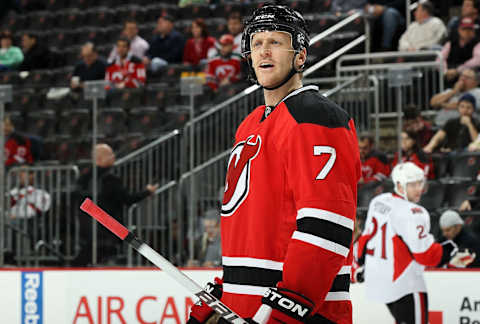
Henrik Tallinder
Speaking of Henrik Tallinder, his absence created a huge void on the New Jersey Devils defense that year. It’s hard to find a way to describe Tallinder’s Devils tenure better than that. At least Tallinder was able to return in the 2012 playoffs and feature in the Devils’ only two wins in their 4-2 Finals loss to the Los Angeles Kings. If he’d been available for the first three losses, maybe things would have ended differently.
Tallinder joined the Devils as a free agent in 2010, signing a four-year, $13.5 million contract, and was a pretty effective player when healthy. In his first year in Red and Black, Tallinder played all 82 games and was second amongst Devils skaters in average ice time only to Ilya Kovalchuk.
11/12/10: EDM @ NJD: Ilya Kovalchuk, 4th of the season (342nd of career) Assisted by Henrik Tallinder and Patrik Elias pic.twitter.com/vjrD3EWuet
— Random Devils Goal A Day (@DevilsGoalADay) September 23, 2022
Things took a turn for the worse after that, where Tallinder would play just 64 games across the 2011-12 and 2012-13 seasons before Lou Lamoriello decided he had seen enough of the 6’4″ Swede.
Henrik Tallinder was traded back to his original team, the Buffalo Sabres, on July 7, 2013, in exchange for Riley Boychuk. Tallinder played 64 games for the Sabres that year in what would be his last year in the NHL. He tried out for the Toronto Maple Leafs and played briefly for the Hartford Wolf Pack in the New York Rangers’ organization before heading to Finland.
Riley Boychuk never played for New Jersey and instead spent 18 games with the Albany Devils, scoring two points. It appears that was his last year of playing professional hockey.
Henrik Tallinder spent one year with ZSC in Switzerland, and then had three productive seasons with TPS in Liiga after leaving North America. Tallinder also won a silver medal with Sweden at the 2014 Winter Olympics in Sochi. Tallinder officially retired from professional hockey in October of 2018 and now lives with his family in Finland.
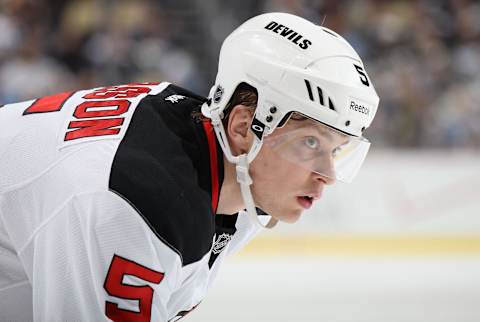
Adam Larsson
After being drafted fourth overall in the 2011 NHL Draft, Adam Larsson was supposed to be the future of the New Jersey Devils’ defense. After making the team outright to start 2011, Larsson became one of the youngest Devils to ever play for the team and chewed up a rather hefty amount of ice time as an 18-year-old. He also regularly played on the team’s power play and penalty kill units.
After returning from his injury, Adam Larsson was a healthy scratch more often than not, and head coach Pete DeBoer instead elected to use veteran Peter Harrold instead. Larsson finally cracked the playoff lineup in Game Two against the Philadelphia Flyers, and would go on to score the game-tying goal in a 4-1 victory. In doing so, he became the first Devils rookie defenseman to score their first playoff goal in their first playoff game.
In classic mid-2010s New Jersey Devils fashion, DeBoer and Co. put Larsson in and out of the lineup after that, instead of playing the stud rookie based on merit. Little did Larsson know that Game One against the New York Rangers would be his last playoff appearance as a New Jersey Devils player. It’s really no wonder why the team couldn’t produce even a half-decent prospect during those lean years following the 2012 playoffs.
Larsson would then be traded to the Edmonton Oilers for Taylor Hall on June 29, 2016, following some uneventful years in the seasons succeeding 2011-12. Hall was great as a Devil and won the Hart Trophy in 2017-18, but he hasn’t done much of anything since. Larsson won a gold medal with Sweden in 2018 as he developed into a defense-first top-pairing defenseman in Edmonton, and reprised that role with the Seattle Kraken after being selected by them in the 2021 Expansion Draft.
Adam Larsson wore the ‘A’ for the Kraken this past season, and alongside Vince Dunn, led them to the playoffs, where they would upset the defending champion Colorado Avalanche in seven games. Larsson has played all 82 games in each of the last two seasons, and scored a career-best 33 points in 2022-23. He will turn 31 in November.
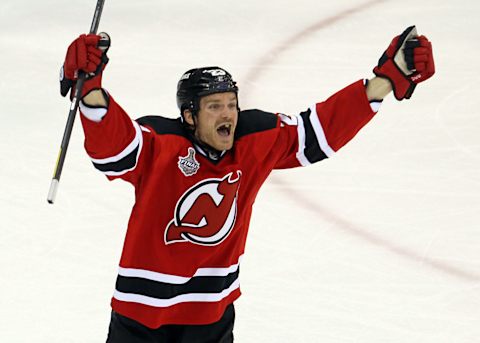
David Clarkson
David Clarkson was a really fun player to watch during his prime years on the New Jersey Devils, but if his departure tells us anything, it’s that grass isn’t always greener on the other side.
Leading up to the 2012 playoffs, David Clarkson scored a whopping 30 goals and added 16 assists, topping his previous bests of 17 and 15, respectively. Clarkson earned a role in the top-nine after spending most of his prior years as a fourth-line grinder. Clearly, he made the most of his opportunity.
A forward with generally good defensive results, David Clarkson found ways to end up on the score sheet too. Clarkson mostly made his name in the front of the net, and scored some important goals doing so.
David Clarkson broke a 1-1 tie in Game 2 of the Eastern Conference Semifinals vs. the Flyers on May 1, 2012. The #NJDevils went on to win, 4-1, to even the series. pic.twitter.com/QsPICepeLz
— New Jersey Devils History (@DevilsOfYore) May 1, 2022
In the playoff games leading up to the Cup Final, Clarkson scored three goals and seven assists. All three of Clarkson’s goals were game-winners. They were: Game Two against the Philadelphia Flyers, Game Five against the Philadelphia Flyers, and Game Two against the New York Rangers.
David Clarkson did not score a goal against the Los Angeles Kings in the 2012 Cup Final, but he did have two assists. Clarkson’s ice time tended to vary greatly all throughout the postseason and dropped a lot after the first two games against the Kings. Clarkson generally scored more points with more ice time, so his inconsistent deployment was just one of many oversights by Pete DeBoer during his tenure as New Jersey Devils coach.
David Clarkson scored 15 goals in the lockout-shortened 2012-13 season before signing a seven-year, $36.75 million contract with the Toronto Maple Leafs the following summer. Over the next three years, Clarkson would score just 17 goals in total, and was traded to the Columbus Blue Jackets only one year into his Maple Leafs contract. Clarkson played just 26 games with the Blue Jackets before retiring.
Since his retirement, David Clarkson has lived in Colorado full-time and briefly coached for Upper Arlington High School in Upper Arlington, Ohio. Clarkson’s name re-surfaced on January 9, 2023 when he was named as Vice President and Director of Player Development for the Colorado Grit of the NAHL.
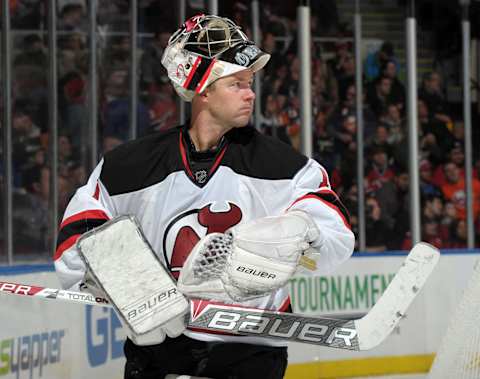
Johan Hedberg
In the twilight of his career and serving as the understudy to Martin Brodeur, Johan Hedberg generally didn’t have a lot of work to do. He joined the New Jersey Devils in July 2010 on a one-year contract at the age of 37. Hedberg spent three years in New Jersey and was productive as a backup in the first two. Hedberg posted save percentages of .912 and .918 in 2010-11 and 2011-12, but fell apart in 2013, posting a paltry 0.883 as a starter after Martin Brodeur got injured.
Hedberg appeared in one playoff game as a Devil in 2011-12 – Game 3 against the Florida Panthers – and was credited with the loss as he allowed the game-winning goal. It was a strange game, as Brodeur was pulled and Hedberg watched the comeback. He stopped 13 of the 14 shots he faced, but he allowed the GWG after the Devils tied it.
2/8/11: CAR @ NJD: Mattias Tedenby, 7th of the season (7th of career) Assisted by Travis Zajac and Johan Hedberg pic.twitter.com/QueGNIeSyt
— Random Devils Goal A Day (@DevilsGoalADay) June 28, 2023
After the lockout-shortened 2012-13 season, Hedberg was bought out of the last year of his two-year contract he signed the year prior to make room for Cory Schneider.
Following his buyout, Hedberg briefly joined the New York Rangers on a tryout basis but did not appear in any games. He would return to the Devils organization for one game with the Albany Devils to fill-in for an injured Keith Kinkaid. Hedberg allowed two goals in 38 minutes and was not credited with a decision.
‘Moose’ retired shortly after and joined his former coach Pete DeBoer in San Jose as the Sharks’ goaltending coach in 2015. Hedberg coached with the Sharks until 2019, when DeBoer, along with the rest of his staff, were dismissed.
After his venture with the Sharks, Johan Hedberg spent three years as head coach of Mora IK in Sweden, with whom he coached top Buffalo Sabres prospect Isak Rosen in 2021-22. Hedberg won HockeyAllsvenskan Coach of the Year in 2020-21, and now serves as head coach for Örebro HK of the SHL. Former NHLer Jhonas Enroth and Vancouver Canucks top prospect Jonathan Lekkerimäki are among those under Hedberg’s tutelage there.
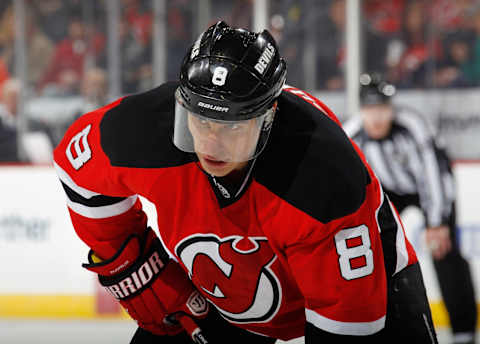
Dainius Zubrus
Dainius Zubrus was one of the team’s most consistent players for most of his tenure with the New Jersey Devils. The Lithuanian forward was extremely versatile, hard-working, and a more than capable defender.
Zubrus joined the New Jersey Devils in the summer of 2007 when he signed a six-year, $20.4 million contract, and would spend the next eight years in Jersey. Prior to the 2012 Playoffs, Zubrus lost in the first round three consecutive times as a Devil (2008, 2009, and 2010). When the 2012 postseason rolled around, Zubrus took his game to a higher level.
Wait what lol #NJDevils pic.twitter.com/9QxjqmSx5P
— Jon (@ByJonBailey) July 27, 2023
In the 2011-12 season, at the age of 33, Dainius Zubrus saw more ice time than any season he’d played in since leaving the Washington Capitals in 2006-07. At 6’5″, Zubrus wreaked havoc for the Devils on both the power play and penalty kill. Seven of his 17 goals that regular season came on special teams, meaning he scored only 10 at even-strength. Despite the low totals, Zubrus finished his chances at an efficient 15.6 percent clip.
In the 2012 Playoffs, Dainius Zubrus became a tone-setter for the New Jersey Devils. He scored three goals and seven assists, and laid 85 hits in just 24 games.
Zubrus had one goal and one assist in the Devils’ first game of the 2012 Playoffs, against the Florida Panthers. Next, he had two assists in Game Two against the Philadelphia Flyers after the Devils were down 1-0 in that series. Then, he had two goals in Game Four to put the Flyers on the ropes with a 3-1 deficit. Zubrus assisted on one more in Game Five and sent the Flyers home for good.
1. Dainius Zubrus was a fun role player to have on the #NJDevils
— Vinnie Parise (@VinnieParise) July 13, 2020
2. Patrik Elias with a SWEET defense to offense play here
3. 🔴🟢 = 🔥 @DevilsOfYore
pic.twitter.com/OSGZzFrIdE
The rest of Zubrus’ 2012 postseason performance was non-descript, but he did assist on Ilya Kovalchuk’s power-play goal in Game 6 against the New York Rangers to put the good guys up 2-0. He also assisted on Patrik Elias’ goal to open the scoring in an important Game 4 against the Los Angeles Kings to help avoid getting swept.
Dainius Zubrus remained with the New Jersey Devils until 2015, when he was bought out of the last year of the three-year extension he signed in 2013. Zubrus tried out for the St. Louis Blues and was released, but was able to reunite with Pete DeBoer in San Jose with the Sharks for the 2015-16 season. The Sharks reached the Stanley Cup Final that year but were ultimately defeated by the Pittsburgh Penguins.
Zubrus retired in the 2016 offseason and resides in Miami, Florida. In 2018, Zubrus was unanimously elected as President of Lithuania’s national ice hockey federation Hockey Lietuva. As of this writing, that role now belongs to fellow Lithuanian and ex-NHLer Darius Kasparaitis.
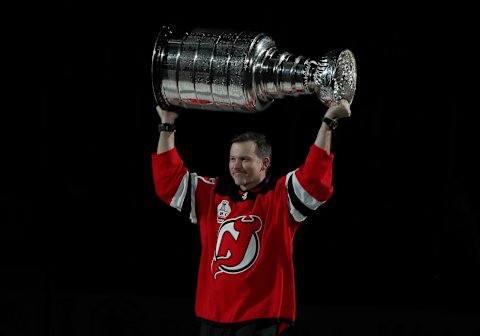
Petr Sykora
A New Jersey Devils legend through and through, Petr Sykora spent the first seven years of his NHL career with the Devils before making pitstops with the Mighty Ducks of Anaheim, New York Rangers, Edmonton Oilers, Pittsburgh Penguins, and Minnesota Wild. After an abbreviated season with the Wild, Sykora spent the 2010-11 season with both HC Plzeň 1929 in the ELH and Dinamo Minsk in the KHL before returning home for one last dance.
Petr Sykora was offered a tryout by the New Jersey Devils at the age of 34 on September 12, 2011, and converted that tryout into an NHL contract weeks later on October 5. Even at his advanced age, Sykora made his 15th and final year in the NHL a good one.
In the 2011-12 season, Petr Sykora scored 21 goals and 23 assists, and managed to play in all 82 regular season games. Not bad for a guy who needed a tryout before making the team.
4/29/12: NJD @ PHI: ECSF G1: Petr Sykora, 1st of the playoffs (33rd of playoff career) Assisted by David Clarkson pic.twitter.com/ODMyARLJbf
— Random Devils Goal A Day (@DevilsGoalADay) November 14, 2022
Sykora was less effective in the 2012 Stanley Cup Playoffs, as he scored only two goals and three assists and played in 18 of a possible 24 games. Still, Sykora’s experience was valuable. Sykora, Martin Brodeur, Patrik Elias, Ryan Carter, and Anton Volchenkov were the only players on the roster who had played in a Stanley Cup Final prior to 2012.
Although things ultimately didn’t have a fairytale ending, Petr Sykora came full circle with the New Jersey Devils. He won a Cup in 2000 and lost one in 2012. In between that time, he lost one in 2008 with the Pittsburgh Penguins and won one with them a year later. He also lost to the Devils in the 2003 Final as a member of the Mighty Ducks.
Sykora’s last year of playing professional hockey was 2012-13 when he played nine total games for SC Bern in Switzerland. Sykora has since retired, but did make an appearance in 2020, as he finally got to take his lap with the Stanley Cup after missing the celebrations in the hospital in 2000.
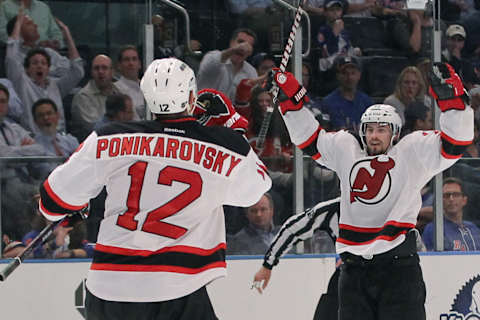
Alexei Ponikarovsky
Take a ride aboard ‘The Poni Express’ and you might come away with one of the most iconic goals in New Jersey Devils history.
The New Jersey Devils acquired Alexei Ponikarovsky from the Carolina Hurricanes in the middle of the 2011-12 season. ‘Poni’ would quickly establish himself as one of the Devils’ most important wingers at both ends of the ice. After posting seven goals and eight assists through his first 49 games with Carolina, Ponikarovsky added another seven goals and 11 assists in just 33 games with New Jersey prior to the start of the postseason.
Alexei Ponikarovsky couldn’t find his shooting gloves in the 2012 Stanley Cup playoffs with just one goal in 24 games, but the goal he scored gave the New Jersey Devils a 4-3 overtime win over the Philadelphia Flyers in Game 3 of that series. Not too long after, he helped create another overtime goal, one that will live in New Jersey Devils infamy.
5/25/12: NYR @ NJD: ECF G6: Adam Henrique, 3rd of the playoffs (3rd of playoff career) Assisted by Ilya Kovalchuk and Alexei Ponikarovsky (@AdamHenrique) pic.twitter.com/4bIbZjbkgX
— Random Devils Goal A Day (@DevilsGoalADay) March 29, 2023
New Jersey Devils fans will always remember Alexei Ponikarovsky as the guy who threw a puck on net in the overtime period of Game Six against the New York Rangers. One Adam Henrique poke later, the roof was blown off of Prudential Center, and the Devils were headed to the Stanley Cup Finals.
Ponikarovsky dished out three more assists in Games 4, 5, and 6 against the Los Angeles Kings, but the Devils were finally eliminated in the latter after doing enough dancing to avoid a sweep.
I guess the #NJDevils were just blessed with these kinds of forwards in the 2010s pic.twitter.com/uCXQp9BcDO
— Jon (@ByJonBailey) July 27, 2023
The New Jersey Devils could not retain Ponikarovsky that offseason, and the hulking Ukrainian winger instead signed with the Winnipeg Jets. After recording only two goals – his only two points in 12 games, the Devils traded for him again. In his second stint in Red and Black he scored two goals and five assists.
Ponikarovsky would leave the NHL at the conclusion of the 2012-13 season and spent the next five seasons with SKA St. Petersburg and Kunlun Red Star of the KHL. With SKA, Ponikarovsky met back up with linemate Ilya Kovalchuk, who also bounced from New Jersey that year.
Alexei Ponikarovsky has been out of hockey since 2018, and his recent whereabouts are unclear.
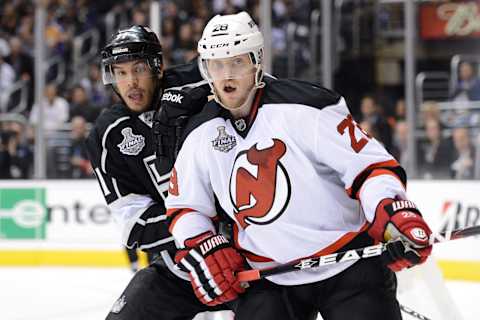
Anton Volchenkov
Anton Volchenkov was an absolute warrior for the New Jersey Devils, but never quite got the recognition he deserved. Like Henrik Tallinder, Volchenkov struggled to stay healthy, and it would be reasonable to attribute this to his physical style of play. Volchenkov blocked 980 shots and made 1062 hits across his NHL career in the regular season.
In New Jersey, Anton Volchenkov didn’t play all that much. He played 60 or more games just once in three years (not including the lockout-shortened 2012-13 season), and when he did play, he was behind Bryce Salvador, Andy Greene, and Henrik Tallinder in the pecking order. Volchenkov was an extremely reliable stay-at-home defenseman, though.
With Henrik Tallinder available for only three games of the 2012 Stanley Cup Playoffs, Volchenkov appeared in all 24 games, scoring one goal and one assist. Marek Zidlicky, Mark Fayne, Adam Larsson, Salvador, and Greene all averaged more playing time than Volchenkov in those playoffs. Tallinder did so across the handful of games he played.
Anton Volchenkov was bought out on June 30, 2014 – four years into the six-year, $25.5 million contract he signed on July 1, 2010. Volchenkov played 46 games for the Nashville Predators in the 2014-15 season but did not play in the 2015-16 season. Volchenkov spent the next two years with Admiral Vladivostok in the KHL, before joining Torpedo Nizhny Novgorod and spending another two seasons there.
Anton Volchenkov has played as recently as the 2019-20 season but will turn 42 in February. After three years out of professional hockey, it’s probably safe to assume Volchenkov is now retired.
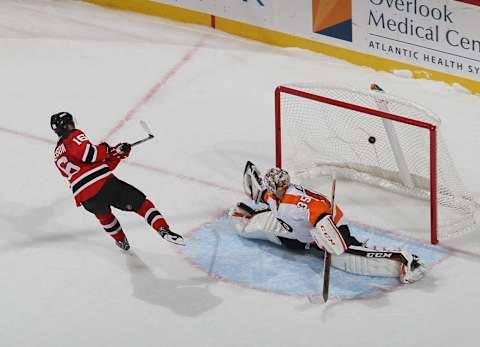
Jacob Josefson
Once upon a time, Jacob Josefson formed, with Mattias Tedenby and Adam Larsson, what was supposed to be the future of the New Jersey Devils. That future never arrived in Newark, New Jersey.
The 20th overall pick by the New Jersey Devils in the 2010 NHL Draft, Jacob Josefson never played first-rounder minutes, and would earn playing time in stretches. Josefson made the Devils full-time starting in the 2012-13 season but only played 40 or more NHL games in a season twice (2014-15 and 2015-16). Josefson’s best season, offensively, came in 2015-16 when he scored four goals and 10 assists in 58 games.
Jacob Josefson’s only NHL playoff experience was six games in the 2012 Stanley Cup Playoffs, and he had one assist in those six games. The New Jersey Devils won in all three of Josefson’s appearances against the New York Rangers but lost in all three of Josefson’s appearances against the Los Angeles Kings.
Jacob Josefson never developed offensively, but he was a strong defensive player and tidy in the faceoff circle. His niche in the NHL was the shootout; Josefson has the 13th-best shootout conversion rate in NHL history (13/24, 54.17 percent), and five of his 13 shootout goals were game-winners.
Josefson’s place in New Jersey Devils infamy lies in his 2014 shootout-winning goal, which broke an 18-game losing streak across shootout competitions. Josefson would join the Buffalo Sabres in 2017-18 and lasted 39 games there before heading home to Sweden. Josefson served as captain of Djurgårdens IF from 2018-19 to 2021-22.
Injuries significantly limited Jacob Josefson’s ability to get on and stay on the ice, and it appears said injuries have prematurely ended Josefson’s playing career. Josefson has not played since the 2020-21 season, reportedly due to post-concussion syndrome.
Jacob Josefson has spent some of his past free time writing a series of memoirs.
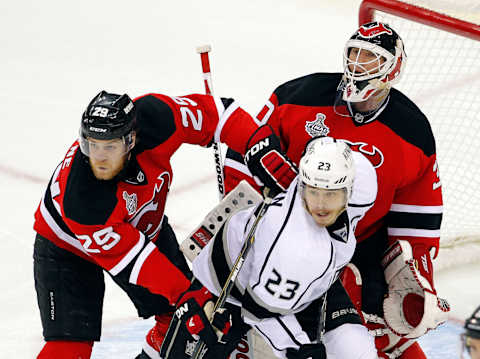
Mark Fayne
If you blinked, you might have missed Mark Fayne’s tenure as a New Jersey Devil. He was drafted in the fifth round, 155th overall by the New Jersey Devils in 2005, and established himself as an NHL regular five years later following the conclusion of his time with Providence College. Fayne never produced mind-blowing numbers offensively but developed a reputation as an analytics darling.
5/6/12: PHI @ NJD: ECSF G4: Dainius Zubrus, 3rd of the playoffs (11th of playoff career) Assisted by Mark Fayne and Martin Brodeur pic.twitter.com/P7RMnEcVWW
— Random Devils Goal A Day (@DevilsGoalADay) March 9, 2023
The 2011-12 season was the only season of Mark Fayne’s career where he played all 82 regular season games. He also played all 24 postseason games and averaged over 20 minutes of ice time while doing so. Fayne excelled in his own end but struggled greatly in his opponents’ end. Fayne, Volchenkov, and Andy Greene all played all 24 playoff games but combined for just one goal and five assists.
Fayne provided three of those assists, but the New Jersey Devils could’ve used the added offense from one of their most reliable blueliners.
Mark Fayne missed 10 or more games in each of his next two seasons with New Jersey, and then left for Edmonton after signing a four-year, $14 million contract with the Oilers in 2014. Fayne failed to recapture his New Jersey Devils form and was out of the NHL by 2016.
Fayne spent 2016-17 and 2017-18 in the AHL and hasn’t played since. Fayne received a PTO from the Boston Bruins in 2018 but failed to earn any kind of contract.
At the end of the day, Mark Fayne burnt some bridges and was out of hockey before the age of 30.
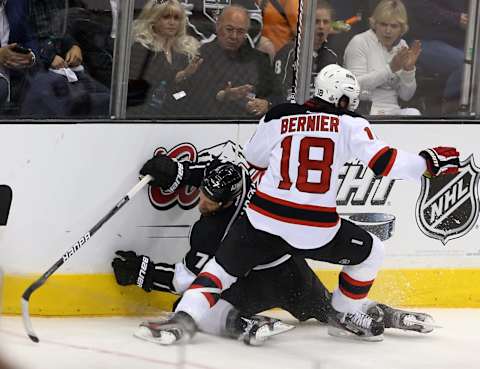
Steve Bernier
Whether he deserves it or not, Steve Bernier will always be remembered by New Jersey Devils fans as the guy who effectively ended their Stanley Cup hopes with his five-minute major boarding penalty in Game 6 of the Finals.
Steve Bernier probably couldn’t have imagined a more sour way to end his first season with the New Jersey Devils than that, and his lowlight penalty was the most memorable moment of his 2011-12 season.
Bernier played in 32 regular season games that year and managed just one goal and five assists. He was better in the playoffs, scoring two goals and five assists in 24 games, but his major penalty in Game 6 erased all of that.
On his third shift of the Devils final game, Steve Bernier took a five-minute major boarding penalty (and a game misconduct) after ramming Los Angeles Kings defenseman Rob Scuderi into the boards head-first. At the time of the penalty, there were just over 10 minutes left in the first period, with the score tied at 0-0.
The Kings scored three times on the five-minute power play. Then, the Kings went up 4-0 to start the second period, and the game was over just like that. Steve Bernier has gone on the record as saying, “I wish I could take that play back.” It’s hard to fault a guy for playing hard and making a mistake, but mistakes have consequences.
Bernier would play three more years with the New Jersey Devils and had a career-best 16 goals and 16 assists in 67 games in the 2014-15 season. Bernier spent the next six years in the New York Islanders organization, but most of his ice time came with the Bridgeport Sound Tigers in the AHL.
Steve Bernier retired in 2020 and joined the Moncton Wildcats in a player development and hockey operations role in late 2021.
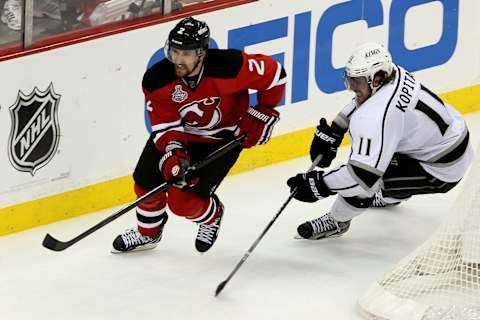
Marek Zidlicky
A mid-season acquisition like Ponikarovsky, Marek Zidlicky, even towards the end of his career, was an effective offensive defenseman who most excelled away from a top-pairing role.
After coming over from the Minnesota Wild in late February 2012, Marek Zidlicky jumped right into the New Jersey Devils’ lineup and led all Devils defensemen in average ice time in the 22 games he played with them in the regular season. Zidlicky also scored two goals and eight points in those 22 games.
Zidlicky played bigger minutes in the playoffs against tougher competition and didn’t do as well. Zidlicky had just two assists in the series against the New York Rangers and one assist in the series against the Los Angeles Kings. His only goal of the playoffs came in Game Four against the Philadelphia Flyers.
Zidlicky was at least influential in the Flyers series, as he had two assists in Game Three and one goal and one assist in Game Four. Still, his nine points in 24 games wasn’t good enough for a player whose reputation was built on offense. In fairness to Zidlicky, it’s not often a team acquires their number one right-handed defenseman near the trade deadline, and it’s usually not one who was abysmal the season prior.
Marek Zidlicky would play the next three seasons with the New Jersey Devils, and was traded to the Detroit Red Wings midway through the 2014-15 season for what would become a 2016 third-round pick. That pick would later be traded to the Pittsburgh Penguins for Beau Bennett. Remember him?
Zidlicky went on to play one more year in the NHL, with the New York Islanders in 2015-16, after being traded away from New Jersey.
Marek Zidlicky’s tenure with the New Jersey Devils was neither here nor there. He wasn’t great, and he wasn’t terrible and was probably out of his depth given his age and skill set. Despite not making his NHL debut until age 26, Zidlicky still carved out a solid career for himself with 836 regular season games played across 12 years in the NHL.
Marek Zidlicky was last reported to be working as general manager of the Czech national team.
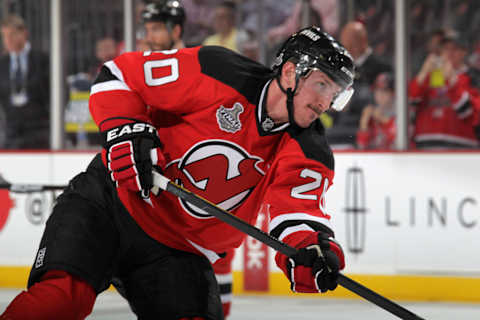
It’s not often you see a team put together an entirely new line in one year, but that’s exactly what the New Jersey Devils did with Ryan Carter and their fourth line in the 2011-12 season. Carter, alongside Steve Bernier and Stephen Gionta, formed a fun fourth line for the Devils for a couple of years.
Like several of his Devils teammates, Carter was acquired by New Jersey during the 2011-12 season and would wind up playing a prominent role with the team as time passed. Carter played the penalty kill, excelled in the faceoff dot, and threw hits. He was a prototypical Devils player for that era.
In the 2011-12 regular season, Ryan Carter scored a modest four goals and four assists across 65 games but served as the team’s Energizer bunny in the playoffs. Carter missed one playoff game, but scored five goals and two assists in the other 23 that he did play in. All five goals came at even strength, and two were game-winners. Carter’s game-winners were in Game One against the Florida Panthers and Game Five against the New York Rangers. He also scored the opening goal in Game Six against the Rangers and the game-tying goal in Game Two against the Rangers.
Ryan Carter played the 2012-13 and 2013-14 seasons with the New Jersey Devils before the team let him walk. After spending three years with the team, Carter was offered a try-out in 2014, but the Devils did not offer him any type of NHL contract, so he instead signed with the Minnesota Wild. Carter played the next two years with the Wild and spent 2016-17 with the Iowa Wild.
Ryan Carter officially retired in 2017 and has since worked with the Minnesota Wild as a color commentator, and digital content producer, among other things. He’s also been an analyst for Fox Sports North.
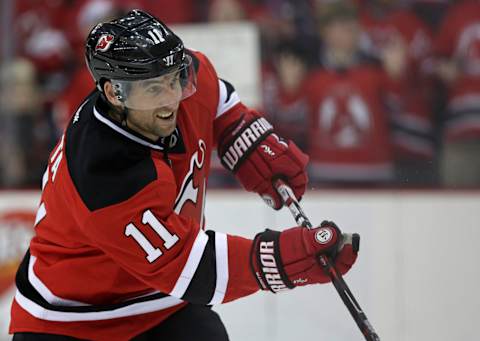
Stephen Gionta
Stephen Gionta, younger brother of former New Jersey Devils sniper Brian Gionta, took a while to get his start with the Devils. But, he made it count.
The 5’7″ forward played in just one regular season game in the 2011-12 season, and spent most of his year serving as captain of the Albany Devils. When the 2012 postseason rolled around, Lou Lamoriello came calling, and Stephen Gionta found himself as a regular in the lineup in short order. Gionta played all 24 playoff games, scoring three goals and four assists.
Those would be Gionta’s last playoff games as a member of the New Jersey Devils, but the small-but-mighty forward was able to establish himself as a penalty-killing defensive demon in his short NHL career.
Gionta would spend the next four seasons with the New Jersey Devils before heading to the New York Islanders ahead of the 2016-17 season. Gionta bounced around between the Islanders and Bridgeport Sound Tigers for most of the next three seasons, reuniting with former linemate Steve Bernier during that time.
Stephen Gionta officially retired from professional hockey on August 1, 2019, and shortly after doing so accepted a job with the Tampa Bay Lightning as a pro scout. Gionta still holds this role and scouted some New Jersey Devils games this past season.
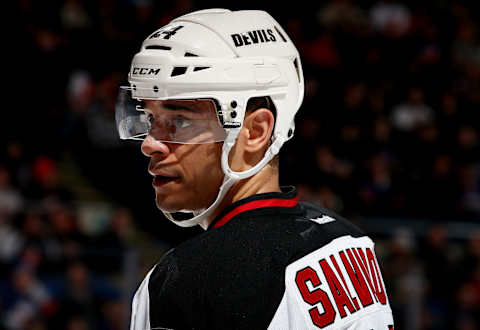
Bryce Salvador
Bryce Salvador’s arrival in New Jersey came under strange circumstances – the St. Louis Blues traded him for Cam Janssen – but Salvador became supremely valuable to the Devils in a short span of time.
Salvador was already 31 by the time he made it to New Jersey, but he made his seven years as a Devil count. ‘Sal’ was an all-defense, no offense defenseman who was a shot blocking, hit making machine in his heyday. However, during the 2012 Stanley Cup Playoffs, Salvador took his game to new heights.
Bryce Salvador scored four or more goals in a single season just twice in his career, but he managed to do that in the 2012 playoffs too. Salvador finished that postseason tied for third on the New Jersey Devils in scoring with Travis Zajac, trailing only Ilya Kovalchuk and Zach Parise. Salvador scored four goals and 10 assists and played in all 24 playoff games. Salvador scored four goals and 10 assists in 79 games in the 2009-10 season; his offensive production was certainly unprecedented.
Salvador came up in big moments, as you would expect of the former New Jersey Devils captain. Sal had two assists in the Game Four win over the Los Angeles Kings, and followed that up with a goal in the Game Five win. In fact, all 14 of Bryce Salvador’s 2012 playoff points came in wins. The New Jersey Devils lost every game in which Salvador did not score a point.
In the years that followed, Bryce Salvador succeeded Zach Parise as New Jersey Devils captain, thus becoming only the third Black captain in NHL history after Dirk Graham and Jarome Iginla. Salvador’s physical health declined immensely in 2013-14 and 2014-15, and he retired ahead of the 2015 season.
The Bryce Salvador we all know and love can be seen covering New Jersey Devils games on MSG Network, as he has been doing since 2017. He’s also a regular guest of the Let’s Go Devils Podcast.
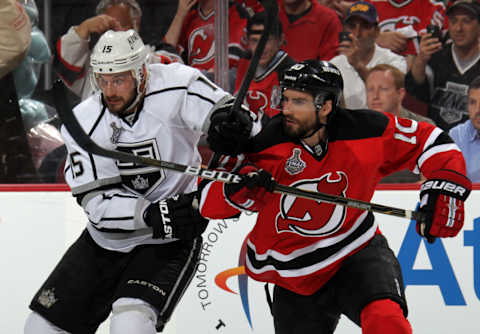
Peter Harrold
Something of a New Jersey Devils legend, Peter Harrold was a depth defenseman for the team for a few years and eventually drifted off into hockey obscurity.
Peter Harrold left the Los Angeles Kings in the summer of 2011 and signed with the New Jersey Devils as a free agent. Harrold would spend most of the 2011-12 season with the Albany Devils and played only 11 regular season games with New Jersey that year. When the Devils magically decided they didn’t trust Adam Larsson enough to play, Peter Harrold became the guy.
Harrold played more playoff games (17) than regular season games (11) and scored zero goals between the 28 games. Harrold posted four assists in the playoffs, and two assists in the regular season. He wasn’t awful by any means, but truthfully it just made sense to have Larsson in after he had played so well prior.
Harrold saw no fewer than 19 minutes of ice time in three Finals games against the Los Angeles Kings, and the New Jersey Devils lost all three of those games. Hindsight is always 20/20, but ideally, the Devils would have had a player with more upside (Larsson) in those games.
Peter Harrold would stick around with the New Jersey Devils for parts of the net for three seasons and eventually found himself back with the Albany Devils in the 2014-15 season. Harrold’s last season of professional hockey was in 2015-16, when he played 70 games with the Chicago Wolves in the AHL.
According to his LinkedIn page, Peter Harrold now works with the Carolina Hurricanes in a player development role after previously serving in a skill development role with them. That means Peter Harrold helped knock the New Jersey Devils out of the playoffs this past year.
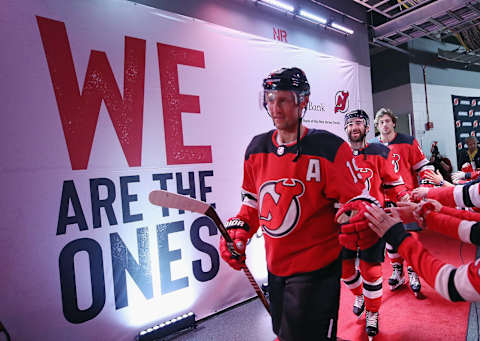
Travis Zajac
Travis Zajac deserved better for his New Jersey Devils career, but at the end of the day, he retired as a Devils legend.
Drafted 20th overall in the 2004 NHL Draft, Travis Zajac quickly became the New Jersey Devils’ top centerman as a rookie in 2006. By his third season in the NHL, Zajac was already a 60-point player, establishing himself as one of the NHL’s premier two-way forwards. Zajac and the Devils had a bad year in the 2010-11 season, and after injury struck Zajac in the 2011-12 season, he was never quite the same offensively.
Zajac didn’t make his 2011-12 season debut until December 16, 2011, and got injured again on January 2, 2012, causing him to sit until his return on March 25. Injuries limited Zajac to just two goals, four assists, and only 15 regular season games, but Zajac got his legs back come playoff time.
Travis Zajac played all 24 playoff games in the New Jersey Devils’ quest for the Stanley Cup, and scored seven goals and seven assists. He also dominated the faceoff dot, winning just over 54 percent of his draws.
Zajac scored some important goals that postseason, like the Game Six overtime winner against the Florida Panthers to force a Game Seven. Zajac also netted the game-winner in Game Four against the New York Rangers and scored the Devils’ third goal in a 5-3 Game Five win over the Rangers.
Travis Zajac served as the New Jersey Devils’ top center until Nico Hischier came along, and got pushed further down the lineup upon the arrival of Jack Hughes.
Just a reminder (for a little peace of mind, maybe) …
— Corey Masisak (@cmasisak22) March 29, 2023
Devils went to FLA for Game 82 in 2019. Got to OT and Travis Zajac scored a goal that dropped NJ from 2nd to 3rd in best lottery odds.
Sky was falling for some that night. Turns out they needed that goal to get Jack Hughes.
On April 7, 2021, Travis Zajac and Kyle Palmieri were traded to the New York Islanders for AJ Greer, Mason Jobst, and two draft picks that became Chase Stillman and Daniil Orlov. Zajac played 13 regular season games and 14 playoff games for the Islanders, scoring one goal and one assist in both the regular season and postseason. Zajac received Lady Byng or Selke votes in 10 of his 15 NHL seasons.
Travis Zajac retired as a New Jersey Devil on September 20, 2021, after signing a one-day contract. As of January 2023, Zajac is the head coach of the New Jersey Colonials 12U Minor 2012 AAA hockey team.
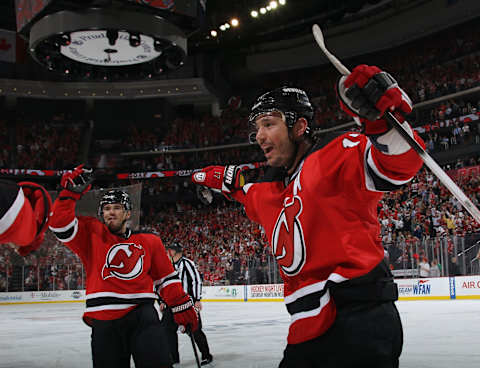
Ilya Kovalchuk
Ilya Kovalchuk might be one of NHL history’s greatest ‘what-if’ stories. Kovalchuk, of course, played just four years with the New Jersey Devils before retiring to go back to Russia with SKA St. Petersburg.
If he hadn’t retired, Kovalchuk might have gone down as one of the best New Jersey Devils in their history, but he did. At least Kovalchuk was able to provide some special moments on a team that needed them.
Ilya Kovalchuk enjoyed his best season as a New Jersey Devil in the 2011-12 season, scoring 37 goals and 83 points in 77 games. He was able to follow that up with eight goals and 19 points in the Devils’ 24 2012 postseason games, which led the team in scoring.
Kovalchuk would dip out to Russia after the 2012-13 lockout-shortened season and returned from ‘retirement’ five years later in the 2018-19 season. Kovalchuk inexcusably linked up with the Los Angeles Kings in his return – the same team that crushed his hopes of hoisting a Stanley Cup a few years prior.
The following year, Kovalchuk was traded to the Montreal Canadiens, and traded again to the Washington Capitals to join fellow Russian superstar Alex Ovechkin in D.C. Kovalchuk had one assist in eight playoff games with the Caps.
Ilya Kovalchuk returned to the KHL again for the 2020-21 season but hasn’t played since his contract was terminated in 2021. It’s unclear whether Ilya Kovalchuk is truly retired, but at this point, it’s looking likely his playing days are over.
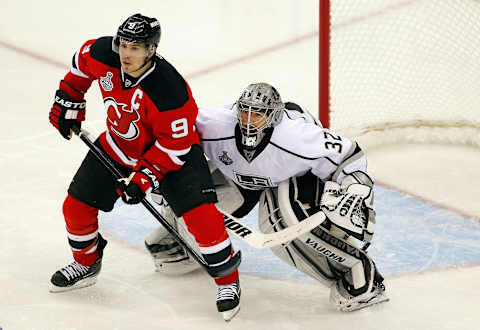
Zach Parise
Ilya Kovalchuk’s partner in crime against the New Jersey Devils organization, Zach Parise, heartbreakingly but understandably left the team one year before Kovalchuk did. Unlike Kovalchuk, Parise actually acted like a human and showed the emotions behind his choice. The door is still creaked open for a Parise return this offseason.
Zach Parise scored 31 goals and 69 points in the 2011-12 season, and wouldn’t reach those heights again. Parise scored 33 goals in 2014-15 but never cracked 30 goals or 60 points again after that.
In the 2012 Stanley Cup Playoffs, Parise scored eight goals and 15 points – two figures he wouldn’t surpass during his time with the Minnesota Wild, or the New York Islanders. Parise’s best individual playoff moment was his two-goal, one-assist performance against the New York Rangers in Game Four.
In a cruel twist of fate, Zach Parise has never made it past the second round of the playoffs since his departure from New Jersey in 2012. His offensive totals have slowly dwindled, although Parise is still an effective player at his advanced age.
Zach Parise has spent the last two years of his playing career in a middle-six role on the New York Islanders. He’s yet to sign a contract for the 2023-24 season and is reportedly mulling retirement.
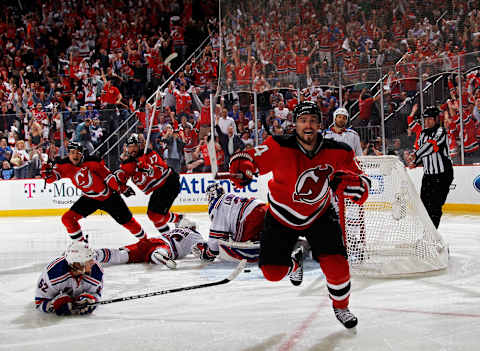
Adam Henrique
Adam Henrique and Adam Larsson are the last men standing from the 2012 Cup squad, and fans have been clamoring for the former’s return for quite a while now. Things particularly heated up in that regard near the trade deadline.
Henrique won’t be returning to the New Jersey Devils in the foreseeable future, but we can reflect on some of his greatest moments in Red and Black. Especially that really cool goal he scored in Game Six against the New York Rangers.
Adam Henrique burst onto the scene as a 21-year-old rookie in the 2011-12 season and had a 51-point season that he hasn’t been able to top since. He even scored four shorthanded goals that year.
Henrique scored five goals and eight assists in 24 playoff games in 2012; three of those five were game-winners. We already know one of them, but how about the other two? Henrique scored the game-winning goal in Game Four against the Los Angeles Kings to help the team avoid a sweep and also scored the Game Seven overtime winner against the Florida Panthers.
Henrique would spend time leading up to his 2017 trade to the Anaheim Ducks as one of the only New Jersey Devils capable of consistently producing offense. Henrique has generally been a Swiss Army knife-type player, combining faceoff expertise with a sneaky-good shot and strong forechecking.
Adam Henrique is heading into his 14th NHL season this year and will turn 34 in February.
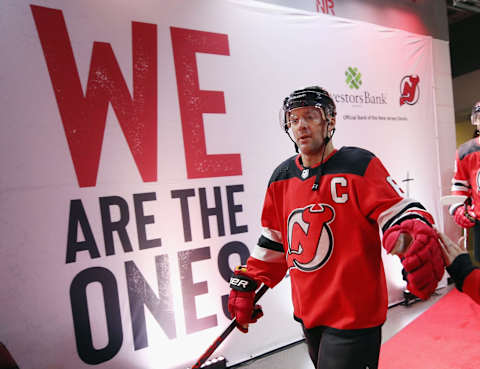
Andy Greene
Andy Greene came out of nowhere to become perhaps the greatest underdog story in New Jersey Devils’ history. An undrafted 5’11” defenseman out of Miami University in Ohio, Andy Greene joined the Devils as a free agent and made the team after a year with the Lowell Devils in the AHL. Greene would spend a decade-and-a-half as a New Jersey Devil; the rest is history.
After some breakout seasons offensively in the two years prior, Andy Greene took a bit of a step back in 2011-12 as he scored just one goal and 16 points in 56 games. Greene cooled off even further in the 2012 Stanley Cup playoffs with just one assist, even though he played in all 24 games. Greene was never a premier offensive player, but he was more than capable so that playoff wasn’t his finest moment.
Andy Greene remained with the New Jersey Devils until February 16, 2020, when he was traded to the New York Islanders for David Quenneville and a 2021 second-round pick. The Devils would later trade that pick and Mikhail Maltsev to the Colorado Avalanche for Ryan Graves, who recently signed with the Pittsburgh Penguins as a free agent.
Andy Greene played his 1,000th NHL game as a member of the New York Islanders on November 16, 2021. Greene also appeared in 40 playoff games as an Islander, but he’ll most fondly be remembered as New Jersey Devils captain – a post he held for five years until he was traded.
The 2021-22 season was Greene’s last, and he signed a one-day contract to retire as a member of the New Jersey Devils on October 12, 2022.
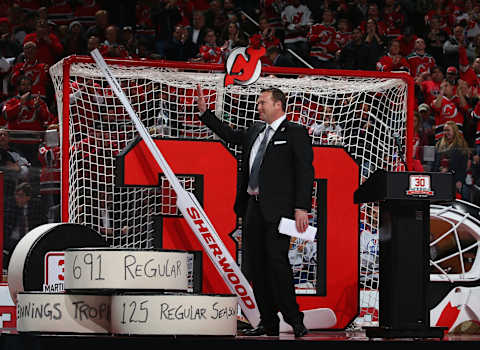
Martin Brodeur
Martin Brodeur might have left hockey, but hockey hasn’t left Martin Brodeur. At the ripe age of 51, the G.O.A.T. is still hanging around and getting things done.
Martin Brodeur’s hockey legacy is certainly greater on the ice than in an office. Brodeur spent 21 years with the New Jersey Devils, and in doing so became the NHL’s all-time leader in wins (691), shutouts (125), and games played (1266).
Brodeur’s performance started to decline in the preceding 2010-11 season but still managed a respectable campaign in the 2011-12 season. In the playoffs, Brodeur turned his play up a few notches for his last dance, but ultimately came up two wins short of his fourth championship. At the age of 39, Brodeur went 14-9 and posted a 0.917 save percentage to pair with one shutout. The shutout came in Game Four against the Florida Panthers to even the series at 2-2.
Martin Brodeur tried to prolong his playing career when he signed with the St. Louis Blues but didn’t hold up all too well. At the age of 42, Brodeur went 3-3-0 in seven appearances and had a save percentage of 0.899 – not far off of his numbers from the two years prior. Fittingly, Brodeur’s last win in the NHL was a shutout over the Colorado Avalanche.
Following his retirement in early 2015, Brodeur re-joined the Blues as assistant general management and maintained that role until 2018. After his three-year contract with the Blues, Brodeur returned home to New Jersey and has since worked with the organization in various front-office roles.
Martin Brodeur is a Senior Adviser and Executive Vice President of Hockey Operations for the New Jersey Devils.
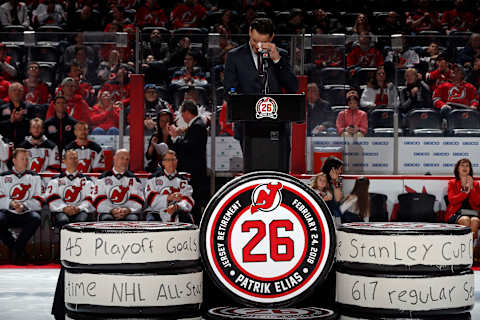
Patrik Elias
Patrik Elias deservedly had his number 26 retired in 2018, but he should be expecting one more important phone call, from Toronto, in the future. It’s a shame he hasn’t gotten it yet, but the time will come.
Patrik Elias spent his entire 20-year NHL career with the New Jersey Devils and wound up becoming the team’s all-time leader in virtually every major statistical category. Elias owns the New Jersey Devils records for points (1,025), goals (408), assists (617), as well as playoff points (125), playoff goals (45), and playoff assists (80).
In the 2011-12 season, Patrik Elias finished second on the team in scoring with 78 points, trailing only Ilya Kovalchuk’s 83. Elias’ 78 points were the third-most in a season in his career, and he did so whilst playing exclusively as a center for the first time in his career. Elias took over 1,000 faceoffs that year.
Patrik Elias’ 2012 postseason performance left a lot to be desired, at the end of the day. Despite playing in all 24 of the team’s playoff games, he scored only five goals and eight points. His scoring totals fell behind Bryce Salvador, Dainius Zubrus, David Clarkson, Alexei Ponikarovsky, and Marek Zidlicky. Elias also did not score a single game-winning goal, which he did the previous three times his Devils teams made it all the way to the finals.
During his tenure as a New Jersey Devil, Patrik Elias did more than his fair share of work and deserved to ride shotgun for once. Unfortunately, the 2012 Stanley Cup team couldn’t help him do that. They were capable of giving him one last shot at a Cup, and that’s exactly what happened. It’s a shame things didn’t turn out differently.
New Jersey sports memorabilia store @Sports_Minded1 helps connect @NJDevils fans with team.https://t.co/S3YKZOnEKx
— NHL.com (@NHLdotcom) July 26, 2023
Patrik Elias sat out the 2016-17 season and officially announced his retirement from hockey on March 31, 2017. Elias’ number 26 was retired on February 24, 2018. Patty now spends some time helping coach New Jersey Devils prospects during the summer and has done some work recruiting Czech players, like Ondrej Palat and Tomas Nosek, to New Jersey.
Related Story. 5 Devils Legends Who Would Dominate Today’s NHL. light
Elias recently made an appearance at Sports Minded Unlimited in Warren, New Jersey, for a public autograph session. He’s been there multiple times in the past, and we’d expect him to return in the near future.